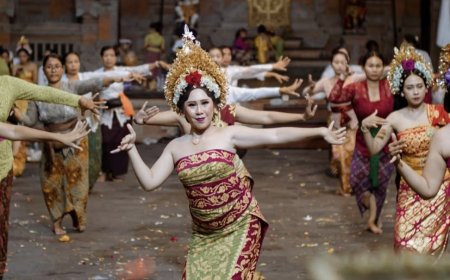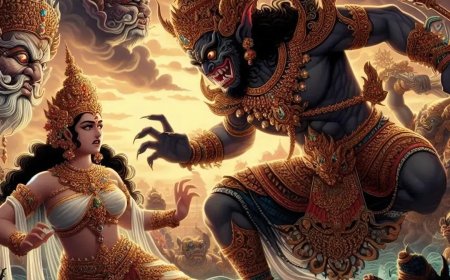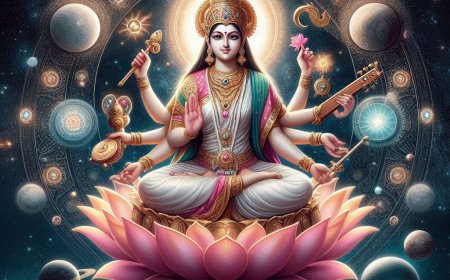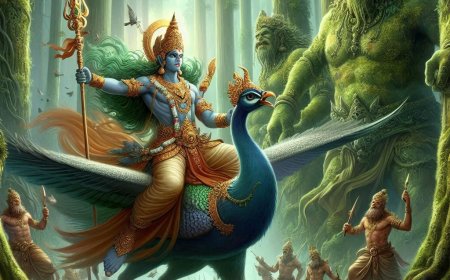The Story of a Thief Who Ended Up as a God of Wealth
The journey of Gunnidhi, a man filled with ambition to achieve prosperity by stealing, but destiny led him to become the God of Wealth, Kubera. The story depicts perseverance, greed, forgiveness and wisdom that slowly transformed his path from darkness to eternal prosperity.
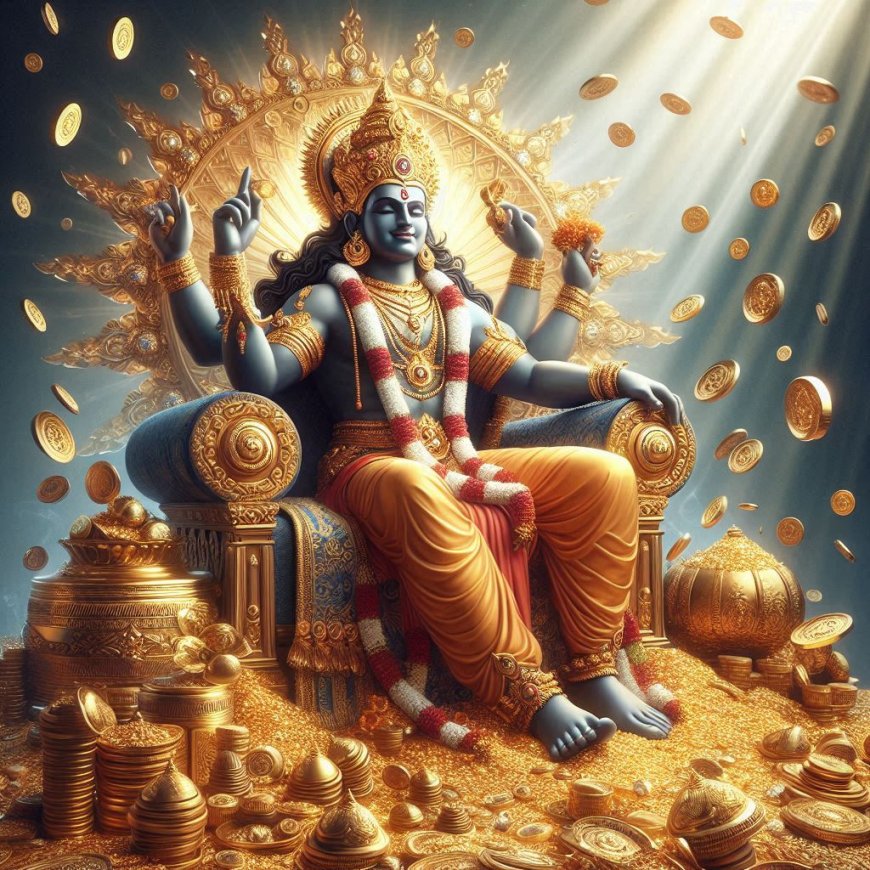
Once upon a time, in a small village, there lived a thief named Gunnidhi, He was known as a man skilled in stealing clothes, food, and money to make a living. Every night, he planned his actions meticulously to ensure he had enough food and money to survive.
One day, Gunnnidhi saw a temple of God Shiva being built in his village. The temple was beautifully designed and very large in size, and it contained many treasures and money donated by the villagers. Gunnidhi regularly visited the site to inspect the temple's construction.
After the temple was completed, Gunnidhi was amazed at how big and beautiful it was. However, in addition to admiration, he also felt a strong urge to get his hands on all the wealth accumulated in the temple. He thought that if he could steal all the money from the temple, he would never have to steal again for the rest of his life.
How big and beautiful the temple of God Shiva (source: private collection)
After a few months, one night, Gunnidhi started devising an ingenious plan to steal money from the temple. He carefully observed all the details of the temple's security and guarding system. Gunnidhi made his way to the temple with a clever strategy to steal all the money. Unfortunately, a strong wind switched off all the lights as he entered the temple.
However, he was also very determined and strong-minded to switch on all the lights again and sit near a dark corner. But once again, the wind blew and blew out all the lamps, so he got up again and lit them one by one. The same thing happened again and again, but Gunnidhi, without a wrinkle on his forehead, continued to switch on the lamps.
After trying repeatedly and facing countless failures, Gunnidhi finally felt desperate. He decided to burn all his clothes, hoping that this way he could avoid being disturbed by the wind and successfully retrieve the desired money.
Gunnidhi burning all his clothes (source: private collection)
With her dedication and devotion, God Shiva was impressed and suddenly appeared before her. He gasped, fell at God Shiva's feet, and began to cry, 'Forgive me, my God, I will not do this again!' Hearing this, God Shiva smiled and said, 'Do not apologise, my son! You have done what you had to do. Although I am impressed by your determination for all this wealth, in your next life, you will be known as the 'God of Wealth', Maharaja Kuber. Tathastu'
God Kubera was actually the son of Saint Vishrava, a rishi renowned for his wisdom, and Ilavida, a noble lady. Kubera was born into a family with a background of kindness and high spirituality. As the eldest son of Vishrava, Kuber inherited the throne and was known as the master of wealth. He was given the responsibility of managing all the wealth of the universe and is often portrayed as a generous and fair god in distributing wealth. Under his rule, the wealth of the world is managed with balance and justice.
However, Kubera's life changed when his father, Vishrava, remarried Kaikesi, a daughter of Asura (a giant). From this marriage, three sons were born: Ravana, Meghnath (or Indrajit), and Kumbhkaran, and a daughter named Surpanakha. Kaikesi, as a descendant of Asura, had a very different lineage from Ilavida, and her sons, especially Ravana, inherited the traits of a violent and ambitious giant.
Although Kubera and Ravana are brothers, they are only half- brothers, having come from different mothers. While Kuber grew up with the values of virtue and purity, Ravana and his siblings grew up in the shadow of the highly ambitious and power-lusting Asura forces. It was this difference that fuelled the animosity between them over time.
The story between Kubera and Ravana reached its peak when Ravana, with his unstoppable ambition, began to envy Kubera's power. At that time, Kubera ruled over the kingdom of Lanka, known as 'Sone ki Lanka' or Golden Lanka. The island of Lanka was famous for its abundant wealth and unrivalled beauty. Under Kubera's rule, Lanka became a symbol of prosperity, a place filled with gold and jewels, and glittering in the sunlight.
However, Ravana, who had a wrathful nature and an infinite desire for power, could not accept the fact that his brother ruled over such a beautiful land. He wanted Lanka for himself and felt that he was more worthy to rule. Therefore, Ravana decided to take over Lanka by force. He used force and trickery to overthrow Kubera from his throne. Ravana not only seized Lanka's wealth and power, but also drove Kubera out of his own land.
God Ravana's (source: private collection)
This expulsion led Kubera to move away from Lanka and seek refuge in a sacred and peaceful place. He chose to settle in a location near the Kailash Mountains, the home of God Shiva, who was known as his spiritual patron. Here, Kubera built his own palace known as 'Alaka,' a place as beautiful and majestic as Lanka. Alaka, located in the northern region of the Himalayas, became the new centre of wealth and prosperity, where Kubera continued to exercise his duties as the God of Wealth with great wisdom.
Despite losing Lanka, Kubera did not hold a grudge against Ravana. Instead, he lived in tranquillity and continued to give away wealth to those who needed it. This reflects Kuber's personality of wisdom and forgiveness, which is not tempted by revenge or worldly ambitions.
Meanwhile, Ravana who now ruled Lanka ruled with an iron fist and great ambition. Under his rule, Lanka remained a rich and powerful land, but it was characterised by cruelty and war. Ravana, with his unlimited power, instigated many conflicts, including the abduction of Sita, Rama's wife.
The story of Kubera and Ravana is not just about a battle between brothers, but also about how wealth and power can be viewed from different angles. Kubera, despite his vast wealth, was never enslaved by power. Instead, he saw his wealth as a tool to help others and fulfil his divine duties. On the other hand, the power-obsessed Ravana ultimately brought about his own destruction.
At the end of the story, Ravana is finally destroyed by God Rama in an epic battle, ending his tyrannical reign in Lanka. Although Ravana loses everything, Kubera continues to carry out his duties as the guardian of wealth, symbolising that true wealth does not come from ambition or greed, but from wise stewardship and a loving heart.
Ravana's epic battle with Lord Rama (source: private collection)
Known as the 'God of Money', God Kubera is worshipped on the auspicious festival of Dhanteras. Dhan means money, and teras means day. This festival is celebrated before Diwali to welcome all the goodness and purity in our homes. Moreover, it is believed that God kubera and Goddess Lakshmi should be worshipped together. So, when God Kubera blesses us with abundant wealth, it can make us selfish. Hence, worshipping Goddess Lakshmi will bring you good fortune and keep you sane when you are showered with wealth and good fortune.










